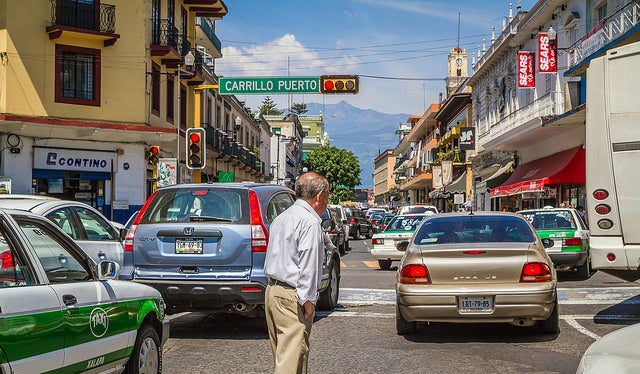In 2015, an estimated 180,000 people in Latin American and Caribbean (LAC) countries died prematurely because of air pollution related diseases, setting a record high for the region’s air pollution mortality burden. In 2005, transportation sources in LAC countries accounted for 5.5% to 17.7% of the mortality burden attributable to fine particles (PM2.5). Since then, the demand for transportation services has grown rapidly: from 2005 to 2015, the region more than doubled its total vehicle fleet, adding 100 million vehicles to its roads. But with careful planning, we can continue to strengthen economic development while driving down total emissions and air pollution deaths. Consider the case of heavy-duty diesel vehicles, which account for less than 5% of the vehicle fleet but can contribute more than 80% of road transport emissions of PM2.5 and NOX (nitrogen oxides, a gaseous precursor to PM2.5 and ozone). Soot-free technologies—defined as “any engine meeting Euro VI or US EPA 2010 standards, or any diesel engine equipped with a diesel particulate filter, natural gas-powered engine, or dedicated electric-drive engine”—eliminate 99% of PM2.5 and 95% of NOX emissions compared to vehicles without these technologies.
Soot-free technologies have been the norm for new heavy-duty vehicles sold in the United States for more than a decade, and today are required in the European Union, Japan, South Korea, Canada, and Turkey.
And other major vehicle markets are taking note: India and Mexico have finalized standards that will require these technologies for new vehicles in 2020 and 2021, respectively, and similar standards are proposed or under discussion in Brazil, China, and Australia. Combined, those markets account for four out of five new truck and bus sales worldwide.
With the two largest vehicle markets in Latin America (Brazil and Mexico) moving ahead, this further breaks down the barriers for the rest of the region to leapfrog to clean, soot-free standards. This year, we launched an initiative called Soot-free Transport that aims to provide resources and support to national and local governments and public transport agencies to transition to soot-free vehicle technologies. As my colleague Kate Blumberg put it earlier this month, here’s our plan for 2018:
Over the course of the coming year, International Council on Clean Transportation will pull together resources, best practices and lessons learned from our own research and the experience of international experts to support national, regional and city governments looking to design, adopt and implement policies needed to eliminate diesel pollution from trucks, buses, and non-road equipment.
Soot-free Transport will tackle:
- Land transport contributions to ambient air pollution, health impacts, and climate change
- Soot-free engines, aftertreatment technologies and fuels
- Best practices on soot-free policies for new and in-use vehicles
- Regulatory design considerations for effective new vehicle standards
- Maintenance, operational, and cost requirements of soot-free technologies
- Compliance and enforcement tools and mechanisms
- City, state, and national policy options to accelerate the transition to soot-free fleets
- Regulatory analyses to support policy adoption
Life-saving transport technologies are not a luxury good: everyone deserves to breathe clean air. And with soot-free vehicles, climate mitigation, improved mobility, and sustainable economic development can integrate seamlessly with clean air goals. Now, Soot-free Transport is seeking to accelerate progress in Latin America—not only for the biggest markets, but for all countries and cities where dedicated public servants, business leaders, development banks, and NGOs are ready to make it happen. You’re invited to get involved in Soot-free Transport by joining our groups on LinkedIn and Facebook, and submit questions and topics that you’d like to see addressed.
*Joshua Miller is a Researcher at the International Council on Clean Transportation (ICCT). He is responsible for leveraging forums for international cooperation to facilitate the transfer of best practices, and monitoring and quantifying the impacts of energy and environmental regulations in the transport sector worldwide. He has developed regulatory impact and cost-benefit assessments for the United States, European Union, Brazil, Mexico, and the Philippines, in addition to global emission inventory analyses and models. Mr. Miller holds a Master in Transportation Technology and Policy from the University of California, Davis and a bachelor in Economics from Vassar College.
*******************************************************************************************************************************
“Regulatory challenges of the transport sector over the next decade” was the central topic of the 7th Regional Policy Dialogue of the Transportation Network 2017, a meeting with representatives of Latin American and Caribbean countries and IDB experts. This link includes the agenda and the presentations of the event.


Leave a Reply